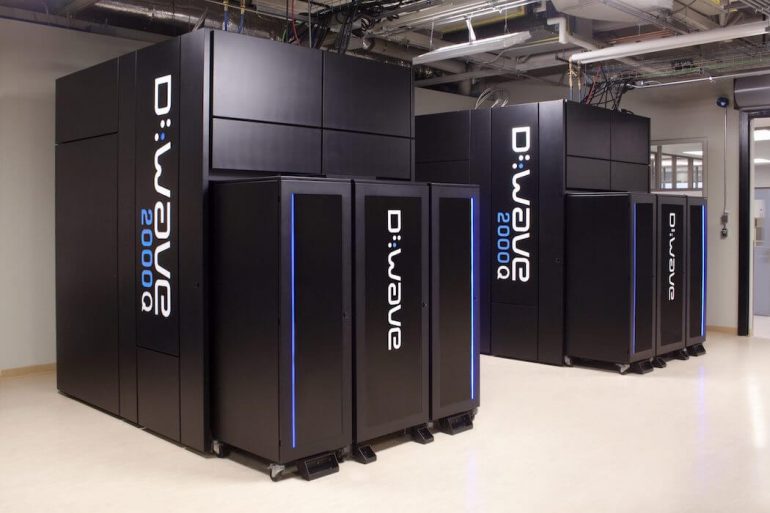Europe just received its first annealing quantum computer, according to claims from D-Wave Systems Inc, as the company ramps up in the race to so-called quantum supremacy – the bid to become the first to successfully commercialize quantum computing.
D-Wave Systems is expanding its work with the Forschungszentrum Jülich Supercomputing Centre in Jülich, Germany, by providing a physical annealing quantum computer.
It’s true that the market opportunity for quantum computing is growing, but the question is how much of that market D-Wave will be able to capture.
The announcement was made as part of the unveiling of a new building at the Jülich Supercomputing Centre, which saw the attendance of government people like German Federal Minister of Education and Research Bettina Stark-Watzinger, EU Commissioner Mariya Gabriel, Canadian ambassador to Germany Stéphane Dion.
The building is a new purpose-built facility designed, in part, to house the computer. The Jülich Supercomputing Centre is a facility for open innovation that provides a unified quantum computing platform as a service along with user support and joint software development.
The expansion is part of the Jülich User Infrastructure for Quantum Computing (JUNIQ), which has provided researchers across Europe with access to various quantum systems since 2019.
Quantum annealing processors are used to solve complex optimization problems such as scheduling.
D-Wave’s quantum computers, which have been available to European users via the cloud since 2019, are particularly suitable for solving difficult optimization problems, the startup claims.
Optimization use cases are ubiquitous in industry and full of computational complexity, according to D-Wave, which cites such examples as the efficient control of traffic flows, financial modeling, preventative healthcare, manufacturing, and logistics.
To date, the company’s customers have developed more than 250 early quantum applications in fields as diverse as financial modeling, flight planning, election modeling, quantum chemistry simulation, automotive engineering, health care, logistics, and more.
While D-Wave’s computer might be the first annealing quantum computer – as opposed to so-called gate quantum computers – in June 2021, IBM delivered a Quantum System One to Europe’s largest application-oriented research organization Fraunhofer-Gesellschaft.
“As businesses and research organizations identify mission-critical problems in need of quantum investment, the market opportunity for quantum computing grows faster than ever,” said Alan Baratz, CEO of D-Wave. “This is particularly true in Europe, where we’re seeing an increasing number of enterprises, universities, and even government entities across the continent already begin to benefit from access to quantum technologies.”
It’s true that the market opportunity for quantum computing is growing, but the question is how much of that market D-Wave will be able to capture. It faces competition from some of the giants of the tech world that have steadfastly pursued the ambition of gaining quantum supremacy.
RELATED: D-Wave launches performance update to existing quantum computer, teases next-generation system
IBM, Alphabet (Google’s parent company), and Alibaba’s cloud service subsidiary Aliyun, and the Chinese Academy of Sciences are all chasing the goal, as are any number of quantum startups, according to Global Data.
Scientific American reports that both the United States and China are funding quantum research in their respective countries with more than $100 million each.
“China has more total patents across the full spectrum of quantum technology, but U.S. companies have a dramatic lead in quantum computing patents. And of course, China has a more sophisticated quantum network and now claims the top two quantum computers,’ the magazine reports.
Where does that leave D-Wave? That remains to be seen. The once-troubled startup appears to be leveraging its relatively new association with Germany to help position itself for rapid commercialization in Europe.
Founded in 1999, D-Wave is a longtime staple of the Canadian tech ecosystem. It was the first startup to offer a commercially available quantum computer.
The startup received $40 million in financing in 2021 from the federal government. The Strategic Innovation Fund financing was meant to support D-Wave’s $120 million development of quantum computer hardware and software systems.
Despite its long history, which has seen more than $376.8 million raised to date, D-Wave has struggled to become a sustainable company. The Globe and Mail reported in 2020 that the company had secured just $75 million USD in customer contracts over its lifespan.
The company reportedly raised $40 million in financing in 2020 as part of a capital restructuring that cut D-Wave’s valuation to less than $213.5 million from $565.1 million. This led to long-time investors, such as the venture arm of the US Central Intelligence Agency and Amazon CEO Jeff Bezos, seeing their stakes fall significantly.
Current CEO Baratz replaced long-time D-Wave CEO Vern Brownell in 2020, reportedly stepping in to speed up the company’s commercialization efforts. The company also made changes to other top executives and long-time board members.
Feature imaged courtesy of D-Wave


